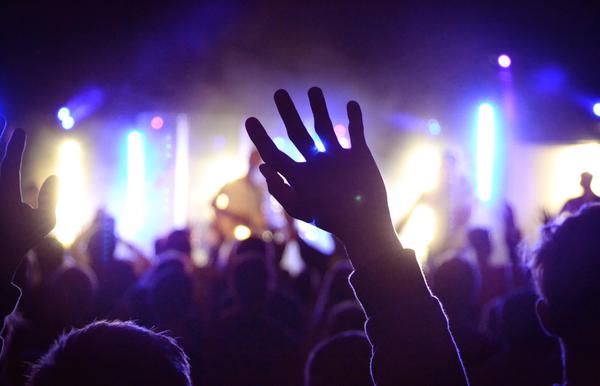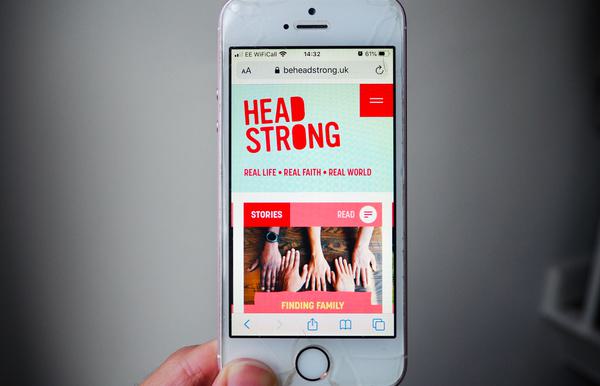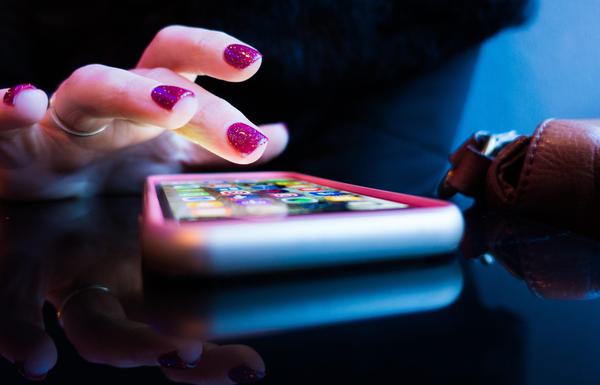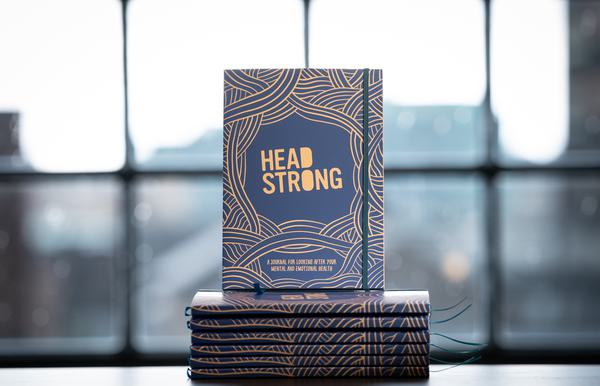How has the COVID-19 lockdown affected young people’s mental health and wellbeing? Lucie Shuker explores the headlines from recent research.
A large number of surveys have been conducted since lockdown that explore young people’s experience of the pandemic and focus particularly on their wellbeing. This short article highlights some of the main findings so far, though these should be interpreted cautiously given how quickly conditions have and are changing.
The majority are coping
Recent years have seen growing public awareness of worrying trends around teenagers’ mental health. It has not been surprising then, to hear concerns raised about the impact of COVID-19 on young people, many of whom are already struggling with anxiety, depression and lack the support to manage the pressures they face. In this context we might be encouraged to find that a representative survey by The Children’s Society reported that overall 84% of children and young people said they were coping well during lockdown. However, when asked about specific aspects of their experience, 86% said they were coping well with increased handwashing and 78% with social distancing. These figures dropped when it came to coping with not being able to see friends (49%) and family (54%).[1]
Some of the benefits of lockdown reported by young people in these surveys include time with family, greater resilience, more gratitude and time for hobbies. In a survey of 2002 13-24 year olds, most young people reported enjoying time with parents as much or more than before, though they also worried about parents and the family more than before.[2] More than one in three 16-24 year olds surveyed by The Prince’s Trust (37%) believe they have gained coping skills or emotional resilience since the outbreak of coronavirus,[3] and a consultation with 150 children and young people found they have valued time to reflect, learn new hobbies or restart old ones, and have experienced a greater sense of gratitude.[4]
Many have struggled
Although many young people have coped well, a significant minority have struggled with their mental health and wellbeing. A representative survey of 4000 8-24 year olds in Great Britain by Barnardo’s found a rise in issues related to mental health and wellbeing for at least one in three of the participating children and young people.[5]
- 41% said they feel more lonely than before lockdown
- 38% said they feel more worried
- 37% said they feel more sad
- 34% said they feel more stressed
- 33% said they have more trouble sleeping
This is to be expected when we consider the numbers of young people who were already known to be vulnerable in different ways. The National Youth Agency (NYA) report that over one million young people have known needs that have been amplified by the pandemic, including those affected by the ‘toxic trio’ of addiction, poor mental health, and domestic abuse. This includes 336,000 who receive formal support, 411,000 who receive some support, but the extent is not known, and 448,000 that are estimated to be in vulnerable families but not known to statutory services. The NYA go further to estimate that an additional 2 million young people will find themselves with ‘emerging needs’ because of COVID-19.[6]
Those with ‘amplified needs’ include young people with existing mental health needs, some of whom were surveyed by Young Minds in the week after lockdown began. In their survey, 84% reported worse mental health following school closures, and 26% said they could no longer access mental health support. They repeated the question in June to a similar cohort and found that the percentage of young people experiencing poor mental health whoagree that coronavirus crisis had made things worse increased from 32% to 41% (see chart). Half of these respondents (50%) did not feel confident about talking to someone about their mental health if they needed to, while more than a quarter (29%) did not agree that there was someone in their life they were able to talk to.[7]
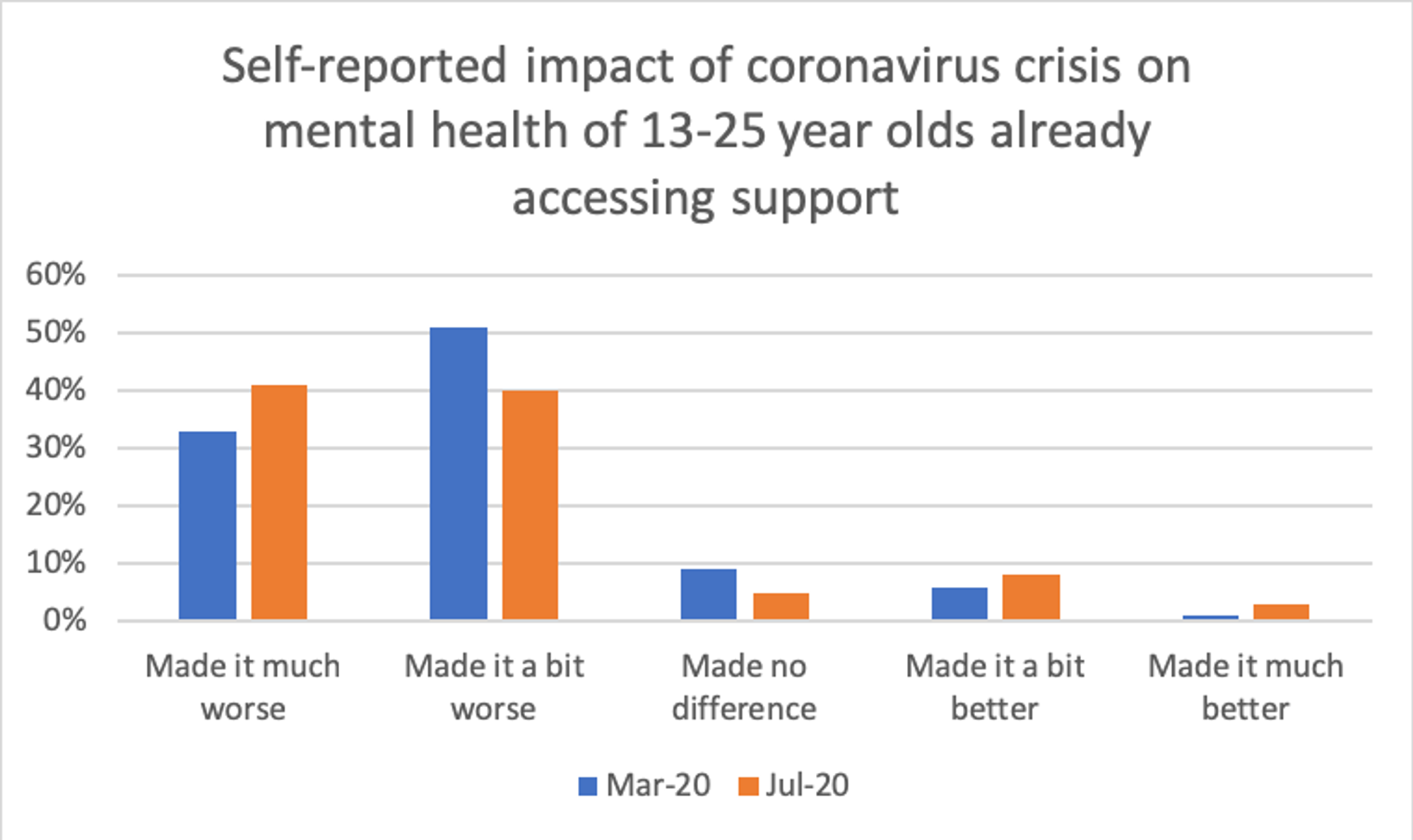
There are also groups of young people that seem to be struggling more. Across surveys published to date there is some evidence to suggest that older teenagers, girls, those from black and minority ethnic backgrounds, those not in education, employment or training and those already struggling with poorer mental health are impacted in particular ways by the pandemic. Although we need more robust data, we should expect that social inequality of various kinds will be exacerbated by current circumstances.
Youth workers are struggling to respond
Youth work organisations play an important role in supporting young people’s mental health but rely on young people’s voluntary engagement. They have had reduced contact with teenagers, and many are struggling to keep going. UK Youth surveyed youth workers and organisations at the start of lockdown, with many youth workers having been furloughed since.
- 88% of respondents indicated that they were likely or very likely to reduce service provision to young people
- 31% of respondents said that staff redundancies were likely
- 18% said permanent closure was likely - nearly one in five may not re-open.
- 71% said that they were likely to reduce staff hours.
- 72% said their organisation needed access to emergency funds.[8]
63% of 290 youth workers surveyed by London Youth said that their youth organisation was moving to some form of digital provision, rather than suspending services and support entirely. However, 31% said that they don’t have the infrastructure to provide digital youth services, and 65% identified an urgent need for this.[9] Lots of services will have found a way to move online, but for many young people this will not have been able to replace the level of support that has been lost.
How can we help?
Some of the recommendations emerging from evidence can be acted on by churches and parents, as well as youth workers.
- Signpost to quality information
- Facilitate young people helping others
- Target support to those with known mental health challenges
- Promote time outdoors
- Celebrate new skills and coping mechanisms
- Help young people learn how to manage uncertainty
If you’re looking for more help, Youthscape has launched a new website with lots of resources for young people to support their mental health and wellbeing. It’s called Headstrong and you can find it here.
This summary of our The Story posts was originally written for ‘Future First’. Thank you to Dr Peter Brierley for permission to republish it here.
FOOTNOTES
[1] The Children’s Society - Life on Hold: Children’s Well-being and COVID-19 July 2020. N=2000, weighted to be representative of the UK
[2] Levita, L (2020) COVID-19 psychological research consortium (C19PRC). Initial research findings on the impact of COVID-19 on the well-being of young people aged 13 to 24 in the UK. N=2002 13-24 year olds, Survey ran 21-29thApril 2020
[3] Young People in Lockdown: A report by The Prince’s Trust and YouGov. N=1,022 16 to 25-year-olds
[4] The Children’s Society - Life on Hold: Children’s Well-being and COVID-19 July 2020. N=2000, weighted to be representative of the UK
[5] Barnardo’s Big Conversation Survey – YouGov. May 2020. N=4,283. weighted to be representative of the UK
[6] Out of Sight – National Youth Agency
[7] Young Minds (summer 2020) Coronavirus: Impact on young people with mental health needs. Survey 1: n= 2,111 13-25 year olds. Survey 2: n= 2036 13-25 year olds
[8] The impact of COVID-19 on young people & the youth sector: UK Youth, April 2020
[9] UK Youth Survey results – Impact of COVID-19 on London Youth Members






